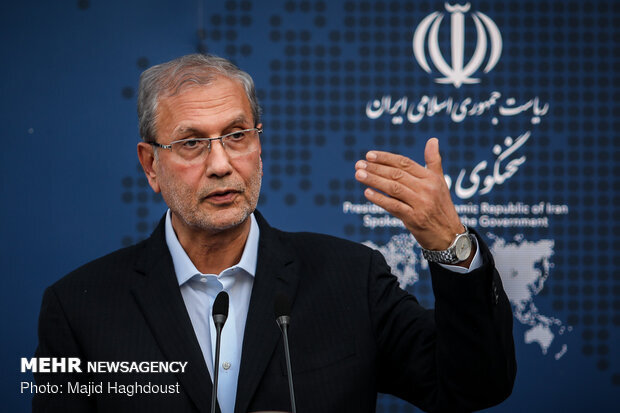Government says backs any decision on FATF

TEHRAN — Government spokesman Ali Rabiei has said the government will support any decision the Expediency Council and the Guardian Council make on the fate of the FATF-related bills, but argued that Iran’s interests will be secured by not exiting the FATF.
Rabiei made the remarks during a press conference in Tehran on Monday.
The parliament ratified the FATF in October 2018. However, the oversight Guardian Council rejected the bill.
Whenever there is a dispute between the parliament and the Guardian Council on a bill, it will be referred to the Expediency Council for final decision. Now it is up to the Expediency Council to reject or ratify the FATF.
The Paris-based Financial Action Task Force (FATF) said on October 18 that it has given Iran a final deadline of February 2020 to tighten its laws against money laundering in compliance with the global watchdog’s financial standards.
“If before February 2020, Iran does not enact the Palermo and Terrorist Financing Conventions in line with the FATF Standards, then the FATF will fully lift the suspension of counter-measures and call on its members and urge all jurisdictions to apply effective counter-measures, in line with recommendation 19,” the FATF said in a statement, Reuters reported.
One of the actions Iran is required to take to appease the FATF is to ratify the CFT, the convention combatting the financing of terrorism.
The government is pushing for the approval of the FATF.
‘Iranians do not deserve to be targeted with sanctions’
Rabiei also said Tehran is trying hard to preserve the 2015 nuclear deal, officially known as the Joint Comprehensive Plan of Action (JCPOA) or Barjam in Persian.
“Iran’s priority has always been preservation of Barjam and still is,” he said. “Barjam is a collective agreement and its survival would depend on the sides’ compliance with their commitments.”
“We are currently facing a new type of war in the form of cruel sanctions which has exposed the entirety of Iran to a new occupation and siege,” government spokesman Ali Rabiei notes. He pointed to the United States’ unilateral sanctions against the Islamic Republic, saying the Iranian nation does not deserve to be targeted with sanctions.
“We should strive to eradicate the impacts of this oppression, as well as the oppression itself,” he added.
U.S. President Donald Trump has adopted a maximum pressure policy against Iran since he walked away from the JCPOA. The policy includes sanctions on Iran’s economy, especially its oil exports, and bans on top Iranian figures and organizations. At the same time, the U.S. president has pushed for talks with Tehran.
Iranian leaders have openly rejected the notion of talks with the U.S. as long as its illegal sanctions against Tehran are in place.
Tehran has described the U.S. sanctions as “economic war” and “economic terrorism”.
Under the JCPOA, the official name for the 2015 nuclear agreement, Iran had agreed to put limits on its nuclear activities in exchange for termination of economic and financial sanctions.
Since the U.S. withdrawal, Britain, France, Germany, Russia, China, and Iran have been trying to salvage the pact, defying Washington’s economic and political pressure.
The United States’ coercive unilateral measures against Iran have also led to heightened tensions in the Middle East, especially in the Persian Gulf.
‘Rouhani’s visits to Malaysia and Japan are instances of Iran’s active diplomacy’
Elsewhere in his remarks, Rabiei referred to President Hassan Rouhani’s visits to Japan and Malaysia, describing them as an important example of Iran’s active diplomacy.
“Diplomatic and talk-based processes for the development of the country and boosting Iran’s stance in the world will never be shut down,” he said.
The spokesman said the economic siege imposed on Iran must and will be broken.
‘Sanctions are a new type of war on Iran’
“We are currently facing a new type of war in the form of cruel sanctions which has exposed the entirety of Iran to a new occupation and siege,” he noted.
Rabiei explained that the blockade will be broken as soon as domestic production prospers so much that the sanctioners see the fruitlessness of their measures.
MH/PA
Leave a Comment